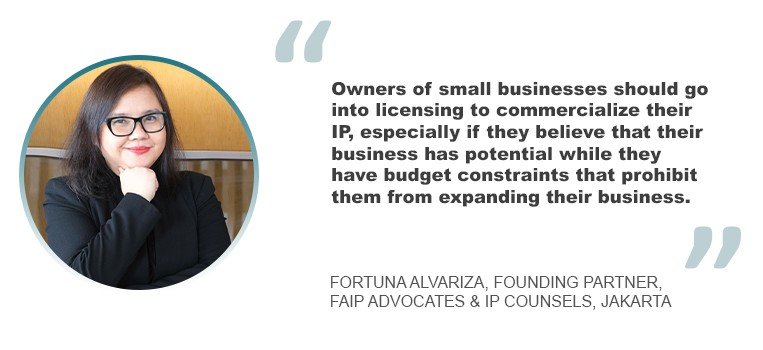Licensing 101 for small business licensors
30 April 2024

Licensing is not reserved for multinationals and other big-name brands alone. Espie Angelica A. de Leon explains how small enterprises can take part too – and reap the many benefits licensing offers.
Should a small business license its IP assets to another company even if it is still of small size?
Licensing can have many benefits. It provides the licensor with an additional revenue stream through the royalties it generates, and licensing aids a company in its expansion as its products or services gain entry into new markets via established domestic operators. This is especially true if the company decides to enter areas outside its comfort zone or capabilities. Furthermore, licensing decreases the licensor’s financial and operational risks because it shares the risks associated with product development, production, marketing and distribution with the licensee.
These benefits will certainly serve small businesses well. So who says only established enterprises can license their IP? Small companies can become licensors too.
“The size of a business shouldn’t necessarily preclude it from licensing,” declared Campbell Featherstone, a partner at Dentons Kensington Swan in Wellington.

“Yes, I believe that owners of small businesses should go into licensing to commercialize their IP, especially if they believe that their business has potential while they have budget constraints [that prohibit them from] expanding their business,” added Fortuna Alvariza, founding partner at FAIP Advocates & IP Counsels in Jakarta.
When should a small business enterprise begin its foray as a licensor?
Andrea Fong, a partner at Wilkinson & Grist in Hong Kong, said a small company should proceed to license its IP only when it has attained confidence in the business model/subject matter.
According to Benjamin Cheong, a partner at Rajah & Tann in Singapore, a small company should go for it once it achieves a good reputation for its brand in order to attract potential licensees. A positive brand reputation will make licensees agree to pay higher license fees.
For Alvariza, a small company may ideally begin licensing a few months after reaching break even. “We consider that it is a stage to find out whether the business is proven as healthy and profitable,” she explained.
Checklist for licensors
Before diving into the licensing game, there are some things that licensors should do.
First, the licensor should register its IP assets in the market(s) where it plans to license its product or service. Full protection of IP rights will help prevent infringement and brand dilution in these markets.
It should strive to gain full understanding of the market it aims to penetrate as well as the prevailing legislation. “It is important to check the requirements in each country in order to make sure that the license agreement is not only applicable for the two parties, but also acknowledged by other third parties. In Indonesia, a license agreement, such as a trademark license agreement, must be recorded at the trademark office. If it is not recorded, the license agreement will not be acknowledged by third parties,” Alvariza shared. But, to be recorded, the IP must first be registered before it can be licensed, she said.

The licensor should also determine which type of licensing model will work best for the company. “The business should do a bit of work to understand what sort of licensing model is likely to work for it and what it is trying to get out of it. Is it a distribution arrangement? A manufacturing arrangement? A license to facilitate further R&D?,” said Featherstone.
It is also important that the licensor chooses its licensee wisely.
Proper diligence is the key. “You need to know you can trust the licensee in terms of what it is capable of delivering, and how it will deliver it,” explained Featherstone. “No matter how good your license agreement is, you don’t want to end up in a situation where you need to rely on it to enforce your rights because things have gone wrong. This is especially the case in certain jurisdictions where the protection and enforcement of IP can be a bit of a quagmire. Action to enforce rights can be incredibly costly and lead to uncertain outcomes which can derail your strategy in that market and sometimes beyond.”
In selecting its licensee, the licensor should check for the following: if the licensee is properly incorporated, whether it has a good track record in the business of offering the goods/services that are being licensed, if it has adequate sales channel to allow the licensed goods/services to reach a wider market, and the amount of license fees the licensee is willing to pay.

“In my view, the integrity of the licensee is very important. Small businesses should carry out checks on the internet, such as litigation searches, or make commercial inquiries to ensure that the potential licensee is not a known infringer. Otherwise, it may find its valuable IP stolen by the licensee or the licensee may set up a competing business after learning about the small enterprise’s business,” said Cheong.
The licensee’s attitude is equally important. “Does the licensee have a commercial mindset and does it show willingness to cooperate with the small enterprise during negotiation stage? This is a good indicator of whether the relationship of the parties will work out at the later stage,” added Cheong.
Performing a background check on the licensee candidate also includes looking into the location where the licensed business will be operating and ensuring that the manpower meets the standard qualifications, among others.
It might also help the small business enterprise, the licensor, to know that from their end, the licensees will likewise do a background check on them. They may look into the licensor’s financial report. In particular, they want to know the licensor’s business profit and expenses for making the licensed business successful. The licensee might also take into consideration the level of complexity needed to run the business and the minimum budget required before the predicted break even stage.
Having mentioned that small businesses can go ahead with licensing their IP a few months after reaching break even, Alvariza stressed that, in practice, it would still depend on the parties. “If the licensee believes that the business has a good prospect and does not mind running the business based on the license from the licensor, the licensing can start without having to consider whether it has [reached] break even or not,” she elaborated.
Furthermore, licensors should think carefully about what they are going to share with the licensee. “You should consider getting an NDA to protect your valuable IP and confidential data before you go too far down the track of negotiating a definitive license agreement, but even then,” Featherstone said. “Be careful with how much proprietary information you disclose.”
The licensing agreement and other documents
The license or licensing agreement – everything comes down to it.

“A carefully drafted and enforceable license agreement is an important pre-requisite for a successful license arrangement,” Fong emphasized.
Enumerating what a carefully drafted and enforceable license contract looks like, Fong stated: “The agreement should cover all aspects of the license and apart from the commercial terms, there should be provisions relating to the IP rights involved, acknowledgement of ownership of IP rights, restraint on proper use of IPs and right to sub-license, development of further IPs during the term of the license, territory and license period, renewal provisions and break clauses, licensor’s duties, licensee’s obligations, payments and calculation means, advertising and legal expenses, treatment of seconds if applicable and goods plus confidential information post termination of license, termination provisions, governing law and mode of handling dispute and others.”
Termination provisions should include post termination non-compete clauses to ensure, for example, that the licensee cannot set up a competing business for a certain period after the license has been terminated.
In drafting these licensing agreements or contracts, small firms acting as the licensors must be willing to engage the services of a legal professional. They must realize that hiring a legal professional is an important investment. A legal document prepared without the intervention of a lawyer or attorney can lead to a situation wherein the licensor is not able to exercise adequate control over the licensee.
Said Featherstone: “There can be a lot of tricky areas that need navigating – who is responsible for defending third party claims, who is responsible for determining whether there is freedom to operate, who is responsible for prosecuting potential IP infringements – and who is going to pay for that? You also may want to consider appropriate ‘off-ramps’ so you can exit the arrangement if things don’t work out.”
He added that small businesses should also keep competition laws in mind, especially when it comes to distribution agreements. Committing a misstep where agreements and competition laws are concerned can lead to large fines and negative publicity. “Depending on the jurisdiction, you need to be careful about allocating markets or customers between licensees, often in the context of granting exclusivity; restrictions on challenging the licensor’s ownership of, and the validity of, the licensed IP; and various other matters when granting a license,” said Featherstone, adding that the European Union has a fairly detailed regime which includes the the Technology Transfer Block Exemption Regulations (TTBER). Technology licensing contracts in connection with IP rights are under the purview of the TTBER which makes “safe harbour” available to the parties involved.
Lastly, small enterprises must be willing to take legal action against errant licensees to protect their IP rights. Taking appropriate legal action will send a clear and loud message that the licensor is serious about protecting its IP rights, thus deterring other licensees from committing the same mistake. “While the small business may be reluctant to spend money on legal actions,” said Cheong, “this would be money well spent to protect its valuable IP rights which is the bedrock of their business.”
Licensing is not reserved for multinationals and other big-name brands alone. Small enterprises can take part too, in this business exercise called licensing and reap the many benefits it offers.
As Cheong said: “Licensing can bring new and exciting opportunities and revenues to small businesses which it may not be able to achieve on its own.”






